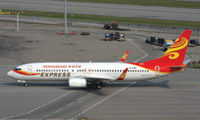Cover Story
MADE IN HONG KONG
The owners of Hong Kong’s first home-grown budget airline, Hong Kong Express, which will launch in October, are receiving a major helping hand from a team of experts who have led the launch of numerous low-cost carriers (LCCs) around the world, including several in Asia. They will work closely with local executives to secure the airline’s place in the regional no-frills market.
July 1st 2013
When it comes to competition, Hong Kong Express’ new deputy chief executive, Andrew Cowen, has no fears. Read More »
 |
| 'We have pared back Hong Kong Express to the very bare bones so it can be transformed and built up again as an LCC' |
| Andrew Cowen Deputy Chief Executive Hong Kong Express |
“There are many LCCs serving Hong Kong, but they are all foreign-owned and controlled. We are able to offer the people of Hong Kong their own LCC. Nobody else can do that,” he said.
Cowen was speaking to Orient Aviation just one day after his appointment as head of Hong Kong Express was announced at a press conference last month by the airline’s executive chairman, Yang Jian Hong.
“Whether it’s Jetstar or AirAsia or any one of the LCCs they all provide competition. Many of them are very professional and very well run so I’m sure they will be very effective competitors,” he said. “But to be quite honest they are nonetheless providing a foreign proposition.”
“We are and will be Hong Kong’s LCC. We are going out to the people of Hong Kong and saying to them: help us shape this airline in the way that meets your requirements. I don’t think you are going to get that from foreign-controlled LCCs.”
Cowen and his team are from Mango Aviation Partners, a consultancy that provides expertise to start-up carriers. But Hong Kong Express is a different animal to the airlines they have advised previously.
Part of Mainland China’s Hainan Airlines Group, it already has an air operators certificate. Hong Kong Express has been flying since 2006 as a sister carrier to Hong Kong Airlines. Now, its owners have decided it will re-launch it as a low-fare, no-frills carrier in October.
Hong Kong Express, said Cowen, will become a fully-functional, stand-alone LCC. He described it as “a twin brand strategy” with the two airlines.
“One of the challenges for full-service carriers is how do you meet the needs of premium passengers all the way through to very price sensitive passengers,” said Cowen.
“Clearly, an emerging strategy around the world is to effectively follow this twin brand strategy, which has been successfully demonstrated by Qantas and Jetstar. That’s the strategy we have adopted here. This will allow Hong Kong Airlines to focus on the premium end of the market.
“We have pared back Hong Kong Express to the very bare bones so it can be transformed and built up again as an LCC. It is operating three A320s with two more arriving by September. This gives us a solid core fleet and will enable us to fundamentally build our network. In the next five years we expect to grow our fleet to around 30 aircraft.”
 |
| Hong Kong Express: fleet to reach 30 aircraft in the next five years |
Hong Kong Express is different to other start-up LCCs, said Cowen. “We are an existing Hong Kong-owned and operated airline. We are transforming and repositioning our airline into a different segment of the market. That’s a quite different process to other carriers.”
Cowen, managing partner and one of the founders of Mango in 2004, started his aviation career with British Airways. He was part of the management team that bought its budget subsidiary GO! in 2001 for £110 million (US$169 million). A year later it was sold to easyJet for £374 million.
In Asia, Mango has been involved in the launch of Jetstar Asia in Singapore, Airphil Express in the Philippines and, more recently, All Nippon Airways (ANA) budget venture, Peach, which is proving Japan’s most successful LCC. Cowen was managing director at Peach.
With him at Hong Kong Express are Mango colleagues Steve Allen, who is commercial director, Charles Johnson, general manager marketing and public relations, pricing and ancillary revenue, Chris Anthony, general manager network planning and revenue management and Greg Green, deputy general manager eCommerce and distribution.
“Mango is a mechanism whereby experienced aviation executives, particularly from the low-cost side, come together to offer their expertise to start-up airlines, not just LCCs,” said Cowen.
“We don’t pretend to know the local market anything like experienced local executives. We seek to combine our LCC expertise with their local expertise to ensure we have a properly structured LCC that is adaptive to the local market. By this I mean flexing and refining the model appropriately.”
As an example, he pointed out the traditional LCC sold directly to customers, but in Japan with Peach it made sense to work closely with travel agents as consumers used them more often. It was the same in Mainland China, said Cowen.
| 'Hong Kong Express aims to offer tickets at 30% below the cheapest seats of its rivals on whatever routes it flies' |
Explained commercial director Steve Allen: “One of the benefits of the Hong Kong market is that it is very tech savvy, mature and high yielding. We see a lot of opportunity. About 80% of Hong Kong residents have smart phones.
“In China it is a whole lot different so we are adapting our model. We recognize the immense opportunity that exists on the Mainland with the growing middle class and we need to adapt the distribution methods accordingly. We need to make accessing Hong Kong Express tickets as simple as possible.”
There are more than 60 million people in the Pearl River Delta - an area within a three hour drive of Hong Kong. “We can’t ignore that fact,” said Allen. “A lot of them, be it for status reasons or convenience, prefer to travel out of Hong Kong so we have a massive market that can be captured.”
Cowen has no doubts the model will succeed. “We have yet to find a market where an LCC would not work,” he said. “If you can fly to destinations you like for less money and in comfort, why wouldn’t you? We don’t think there’s any market in the world that is not able to support an LCC.
“There are many people in Hong Kong that would like to travel to China and surrounding regions. Fares generally in and out of Hong Kong are pretty expensive so from our research we believe an LCC here will be very successful.”
Neither is he concerned about slot constraints at a busy Hong Kong International Airport, which won’t have a third runway until around 2020.
“There are plenty of slots and stands at non-peak times. There is also an opportunity for an airport to be operated more efficiently,” said Cowen.
“For example, we have seen how Heathrow, Gatwick and Dubai have utilized their runways and their facilities with increasing efficiency. We have no doubt that Hong Kong airport, in advance of its expansion, whether runways or terminals, will be taking note of how other airports have managed capacity growth.”
Nevertheless, the airline is moving to arrange cover if problems do arise. A bridge connecting Hong Kong with Macau and Mainland China is scheduled to be completed by 2015 and Hong Kong Express is in discussions with the Macanese authorities about using its airport as an alternate gateway.
“As more surface transport links fall into place, linking cities in the Delta, it will give us easy access to a much greater population pool, many of whom will be looking at the low fares we offer and will make a judgment that it is worth travelling to the Hong Kong airport to fly with us,” said Cowen.
With potential rival Jetstar Hong Kong, the joint venture between Qantas, China Eastern Airlines and its new partner, the Shun Tak conglomerate, continuing to grapple with the thorny question of whether it is genuinely a Hong Kong-controlled airline, Cowen is unequivocal about Hong Kong Express’ positioning.
“All our history is tied with Hong Kong. Of course, we have significant investment from the [China-based] Hainan Airlines Group and some of our executives are not from Hong Kong. But the decisions are made here in Hong Kong,” he said.
“I’m not going to talk about other budget carriers specifically, but most of their key decisions are controlled from, shall we say, other cities.”
With regards to routes, the new airline will complement its sister carrier, Hong Kong Airlines, which will focus on business orientated traffic to major hubs such as Beijing and Shanghai. Hong Kong Express will operate to more leisure-orientated destinations.
It has identified new routes, including Kunming and Chongqing in Mainland China and Kota Kinabalu in Malaysia. It will mainly operate in Southeast Asia, Mainland China, Japan and Korea.
The carrier aims to offer tickets at 30% below the cheapest seats of its rivals on whatever routes it flies. But it is also promising high quality service. As its chairman, Yang, put it: “The transformation is a new challenge that we have set for ourselves. We are well prepared.”